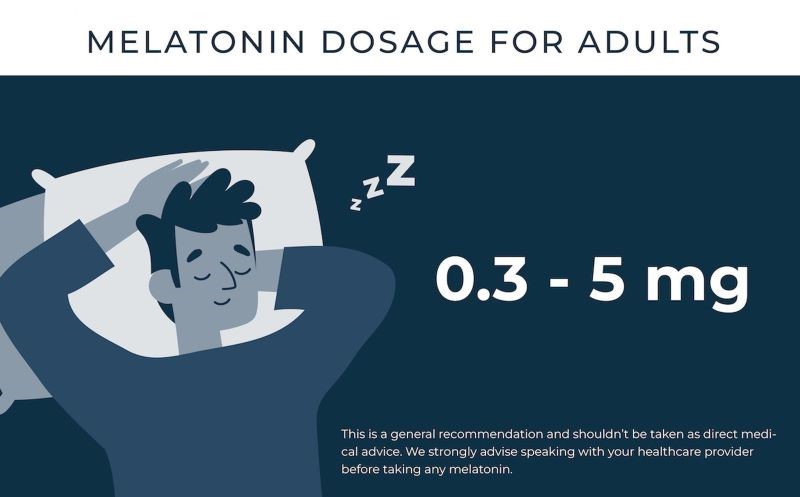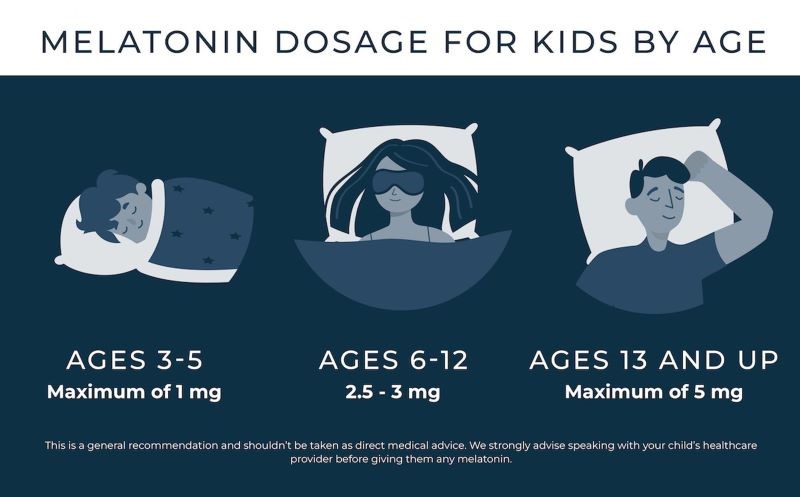If you’re struggling to sleep, you may have considered taking melatonin supplements. After all, melatonin use is on the rise among both adults1 and children2 in the United States, and for good reason – research shows melatonin supplements could help improve overall sleep quality3.
However, melatonin is not regulated as thoroughly as medications, so you’ll want to be careful about how much you take, when you take it, and the type of melatonin you’re buying.
Please note: you should consult your healthcare provider before starting melatonin.
What Is the Recommended Dosage of Melatonin for Adults?

The body’s pineal gland naturally produces4 the melatonin hormone, and the amount of melatonin we naturally produce decreases as we age. Because of this, the recommended melatonin dosage will differ according to your age.
Generally, doctors recommend between 0.3 and 5 milligrams (mg)5 of melatonin for adults.
It’s important to note that less is usually better when it comes to melatonin. Experts at Cleveland Clinic recommend starting with the lowest possible dose6 – between 0.5 and 1 milligrams.
After the age of 55, things change a little bit. This is when our bodies are producing far less melatonin. Some research suggests that taking the lowest possible dose7 (around 0.1 milligrams) will be best for older adults as this more closely mimics the body’s natural, lower production of melatonin. Other, more recent research says that 5 milligrams is the ideal dose8 for older adults since this will make up for the body’s lower production of melatonin.
We are still learning a lot about melatonin’s dosage and various uses. If your dosage is enough to help you sleep better, you can stick with that – there is no need to increase your dosage9 over time. If this dose is too low, you can increase it by 1 milligram each week, not exceeding 5 milligrams if you’re over 55.8
Is Melatonin Safe for Children?
Melatonin supplements are generally considered safe for kids10, as long as the dose is appropriate and any behavioral or environmental issues impacting their sleep are also addressed. However, melatonin supplements may affect children differently than adults for a few important reasons.
Side effects are not common in children, but experts say side effects may include headaches, increased bedwetting, nightmares, dizziness, mood changes, and morning grogginess. They add that these side effects should go away once the child stops taking melatonin.10
There is also some concern that melatonin supplements may impact puberty. Shortly before puberty, melatonin levels drop11, and researchers are working to find whether taking melatonin supplements during this time might impact this natural process, possibly delaying the onset of puberty.
Melatonin Dosage for Children

Because there is limited information available about melatonin’s effects on puberty, experts agree that it is best to use melatonin at the lowest effective dose for a short period of time for most children.10
- Under 3 Years Old: Children under three should not use melatonin. According to Boston Children’s Hospital, children are producing plenty of melatonin at this age, and their sleep issues are almost always behavioral in nature.10
- 3-5 Years Old: Children at this age should take a maximum of 1 milligram of melatonin12.
- 6-12 Years Old: Doctors recommend a maximum of 2.5-3 milligrams of melatonin in children between ages 6 and 12.12
- 13+ Years Old: Doctors recommend a maximum of 5 milligrams of melatonin for children 13 and up.12
When Should I Take Melatonin?
The body naturally starts to produce melatonin about two hours13 before bedtime. To help your body’s natural process, experts with Johns Hopkins Medicine recommend taking melatonin supplements around this time as well – one to two hours before you plan on going to sleep.13
To maximize its effectiveness, you’ll also want to dim the lights and avoid looking at blue-light-emitting devices like smartphones, TVs, and laptops. The reason for this is that blue light can impede melatonin production, diminishing the supplement’s effectiveness.4
Melatonin Side Effects
According to the National Health Service (NHS) of England, most people won’t experience side effects14, though they say potential side effects might include:
- Headache
- Tiredness during the day
- Stomach ache or nausea
- Dizziness
- Irritability
- Vivid dreams or nightmares
- Dry or itchy skin
- Pains in arms or legs
If you experience these side effects, try lowering your dose.
According to the NHS, the following side effects are rare, but they advise seeking medical help if you experience any of them:
- Changes in eyesight or blurry vision
- Feeling faint or passing out
- Vertigo
- Confusion
- Nonstop bleeding or unexplained bruising
In rare cases, certain people may have an allergy to melatonin supplements (or an ingredient in them). Symptoms of an allergic reaction include swelling of the lips, tongue, or mouth; struggling to breathe, a tight-feeling throat, paling of the skin, sudden confusion or dizziness, going limp, or fainting.14
If you or somebody you know seems to be having an allergic reaction or a rare, serious side effect from taking melatonin, you should seek immediate medical care.
Can I Take Too Much Melatonin?
Yes, you can take too much melatonin. Calls to poison control15 have gone up over the past decade regarding melatonin overdoses (taking too much melatonin), especially in children.
The annual number of melatonin ingestions increased by 530 percent, and the number of hospitalizations and more serious outcomes from melatonin ingestion increased as well. The hospitalizations and more severe outcomes were mostly related to a rise in unintentional ingestions among children under five years old. Five children required mechanical ventilation, and two children passed away. It’s reported that both children who died were under the age of two.15
According to the University of Washington School of Medicine16, a person might exhibit the following signs if they’ve taken too much melatonin:
- Excessive sleepiness
- Vomiting and trouble breathing
- Headaches
- Blood pressure changes
- Gastrointestinal problems
- Changes in other hormone levels
- Mood problems
How to Find Safe Melatonin
Melatonin is sold over-the-counter in the United States. However, the FDA doesn’t regulate the ingredients17 as they do with medication. Because of this, studies have found18 that the melatonin levels in certain supplements can be very different from what they list on the label.
Consider the following tips when you look for a melatonin supplement:
- Make sure your supplements are third-party approved – On the label, look for certifications from the U.S. Pharmacopia19 (USP) and NSF International20. These certifications help ensure that your supplements only contain the exact ingredients listed on the label.
- Read through customer reviews – Read through some unbiased customer reviews. How does this supplement seem to make other people feel? Have other customers experienced negative side effects? While everyone can react differently, you probably want to avoid a supplement with a bunch of bad reviews.
- Make sure it’s the right dosage – When buying your supplement, make sure it contains the appropriate dosage. We also advise consulting your healthcare provider before taking any melatonin.
Check out our guide: Best Melatonin Supplements for Sleep
Other Ways to Sleep Better
- Establish a calming nightly routine for yourself – Doing something relaxing each night, like meditating, reading, journaling, or taking a bath, should not only help you unwind but can also signal to your body that it’s time for bed.
- Create an ideal sleep environment – Your bedroom should be dark, quiet, and cool – sort of like a cave. You should also keep it clean and peaceful, and make sure you have a quality mattress to sleep on.
- Keep a regular sleep schedule – Going to bed and waking up at the same time each day can help regulate your circadian rhythm and get your sleep schedule back on track.
- Avoid alcohol – You might think that a nightcap will help you sleep easier, but research shows21 that alcohol can lead to more disrupted sleep and increase the risk of sleep-related breathing issues like snoring and obstructive sleep apnea.
- Limit afternoon naps – Taking naps in the afternoon can make sleeping at night more difficult. If you need to take a nap, we’d recommend limiting it to 20 minutes in the early afternoon.
- No late-night dinners – Eating a large meal just before bed can leave you feeling uncomfortable before bed – but so can going to bed hungry. If you need a late-night snack, we recommend something simple like whole wheat toast or a small bowl of oatmeal. These foods also trigger the release of serotonin22, which may help you sleep.
- Try magnesium – If melatonin doesn’t seem like a good fit for you, magnesium supplements might be more your style. They are also considered to be quite safe and can help relax the body and mind before bed.
Read more: Magnesium vs. Melatonin
Frequently Asked Questions
Can I mix melatonin with caffeine?
You should avoid taking melatonin with caffeine. The point of caffeine is to help you feel more alert, whereas melatonin supplements are meant to help facilitate sleepiness. Also, researchers found that taking caffeine in the evening can delay the circadian rhythm23, thus delaying the body’s natural melatonin production.
Is it safe to mix melatonin with alcohol?
Experts advise against24 taking melatonin and alcohol together as they say it can impact the functionality of melatonin.
Can I take melatonin if I’m pregnant or breastfeeding?
Current research25 suggests that taking melatonin while pregnant or breastfeeding should be safe for both parent and baby – but we strongly urge you to speak to your healthcare provider first.
Can I take melatonin for jet lag?
Melatonin supplements are an excellent tool for dealing with jet lag.17
Experts at Johns Hopkins recommend taking melatonin two hours before your bedtime at your destination starting a few days before your trip.13 You can continue taking it two hours before bedtime once you’re in your new location, and then two hours before bedtime when you get home. Do this until you’re back on your regular sleep schedule. This should help your body in the transition between time zones.

Natalie Grigson
Writer
About Author
Natalie is a content writer for Sleep Advisor with a deep passion for all things health and a fascination with the mysterious activity that is sleep. Outside of writing about sleep, she is a bestselling author, improviser, and creative writing teacher based out of Austin.
Side Sleeper
References:
- Reynolds, Sharon. “Use of melatonin supplements rising among adults”. National Institutes of Health. 2022.
- Osborne, Margaret. “SMART NEWS Melatonin Use Is Rising in U.S. Children, Study Finds”. Smithsonian Magazine. 2023.
- Fatemeh, Gholami., et al. “Effect of melatonin supplementation on sleep quality: a systematic review and meta-analysis of randomized controlled trials”. National Library of Medicine. 2022.
- Arendt PhD, Josephine., Aulinas MD PhD, Anna. “Physiology of the Pineal Gland and Melatonin”. Endotext. Last modified October 30, 2022.
- “Melatonin”. FamilyDoctor.org. Last modified August 2023.
- “Melatonin: How Much Should You Take?”. Cleveland Clinic. 2022.
- Vural, Esmée M.S., van Munster, Barbara C., de Rooij, Sophia E. “Optimal dosages for melatonin supplementation therapy in older adults: a systematic review of current literature”. Drugs Aging. 2014.
- “Researchers find sleep benefit in higher dose of melatonin”. Harvard Gazette. 2022.
- Bauer MD, Brent A. “Is melatonin a helpful sleep aid — and what should I know about melatonin side effects?”. Mayo Clinic. 2022.
- Fliesler, Nancy. “Melatonin for kids: Is it effective? Is it safe?”. Boston Children’s Hospital. 2022.
- Boafo, Addo., et al. “Could long-term administration of melatonin to prepubertal children affect timing of puberty? A clinician’s perspective”. Nature and Science of Sleep. 2019.
- Janjua MD, Irvin., Goldman MD, Ran D. “Sleep-related melatonin use in healthy children”. Canadian Family Physician. 2016.
- “Melatonin for Sleep: Does It Work?”. Johns Hopkins Medicine. Webpage accessed January 4, 2024.
- “Side effects of melatonin”. National Health Service. Last modified February 13, 2023.
- Lelak MD, Karima., et al. “Pediatric Melatonin Ingestions — United States, 2012–2021”. Centers for Disease Control and Prevention. Last modified June 2, 2022.
- Boynton, Emily. “Melatonin Overdose Is on the Rise: 3 Signs to Know”. Right as Rain by UW Medicine. 2022.
- Savage, Rosemary A., et. al. “Melatonin”. National Library of Medicine. Last modified August 8, 2022.
- Erland, Lauren A.E., Saxena, Praveen K. “Melatonin Natural Health Products and Supplements: Presence of Serotonin and Significant Variability of Melatonin Content”. Journal of Clinical Sleep Medicine. 2017.
- “USP Verified Mark”. USP.org. Webpage accessed January 4, 2024.
- “Certified Products and Systems”. NSF.org. Webpage accessed January 4, 2024.
- He, Sean., Hasler PhD, Brant P., Chakravorty MD, Subhajit. “Alcohol and Sleep-Related Problems”. National Library of Medicine. 2019.
- “Better Sleep: 3 Simple Diet Tweaks”. Johns Hopkins Medicine. Webpage accessed January 4, 2024.
- Burke, Tina M., et al. “Effects of caffeine on the human circadian clock in vivo and in vitro”. National Library of Medicine. 2015.
- “Common questions about melatonin”. National Health Service. Last modified February 13, 2023.
- Vine, Tya., Brown, Gregory M., Frey, Benicio N. “Melatonin use during pregnancy and lactation: A scoping review of human studies”. National Library of Medicine. 2022.
